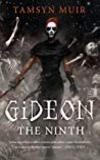
One day eighteen years ago, Gideon’s mother had tumbled down the middle of the shaft in a dragchute and a battered hazard suite, like some moth drifting slowly down into the dark. The suit had been out of power for a couple of minutes. The woman landed brain-dead. All the battery power had been sucked away by a bio-container plugged into the suit, the kind you’d care a transplant limb in, and inside that container was Gideon, only a day old.
This was obviously mysterious as hell.
Man that’s a ride.
I’ve heard Gideon the Ninth described as Lesbian Necromancers in Space.
Lesbian :
Check. It’s fairly subtle for the most part, but it’s a definite part of the personality of a number of the main characters. The best way (in my opinion) to work a character’s sexuality into any book not explicitly about sexuality, no matter what their leanings may be.
The relationship between the titular Gideon and her childhood frenemy turned whatever the relationship between Necromancer and Cavalier Harrow is absolutely a joy to read and really the core of the book. They love to hate and hate to love one another and the snark between the two is fantastic.
Necromancers :
Oh yeah.
“God, no!” said Harrow. “All you need to know is that you’ll do what I say, or I’ll mix bone meal in with your breakfast and punch my way through your gut.”
Which was, Gideon had to admit, entirely plausible.
While we never do get all of the answers to how worldbuilding works in this universe, the essential idea is that there’s an undying Emperor, lord of Necromancy out there somewhere and under him are eight nine houses, each with their own specialties. The Ninth House seems really good at controlling bones and being creepy. Impressive, the latter, being the creepy ones even among necromancers.
On top of that, the core of the plot revolves around said Emperor summoning the leaders of each out house to a sort of competition to become new Lyctors– even more powerful necromancers–through some initially unspecified series of tests.
In Space :
That was a good point. If there was one thing Gideon knew about necromancers, it was that they needed power. Thanergy–death juice–was abundant wherever things had died or were dying. Deep space was a necro’s nightmare, because nothing had never been alive out there, so there was no big puddles of death lying around for Harrow and her ilk to suck up with a straw.
So… yeah. It’s Lesbian Necromancers in Space. And it’s so much more. It’s dark, it’s funny, it’s touching, and it’s got some crazy and wonderful worldbuilding.
I think my only real complain with the series is I was not at all happy with the ending. That’s not at all to say it’s a bad ending, but … I wanted something else. It’s not my book to right and I am so going to read the sequels (wherein maybe this isn’t a problem after all), but in some parallel reality somewhere, I would really like to see where else it could have gone.
Well, well worth the read.